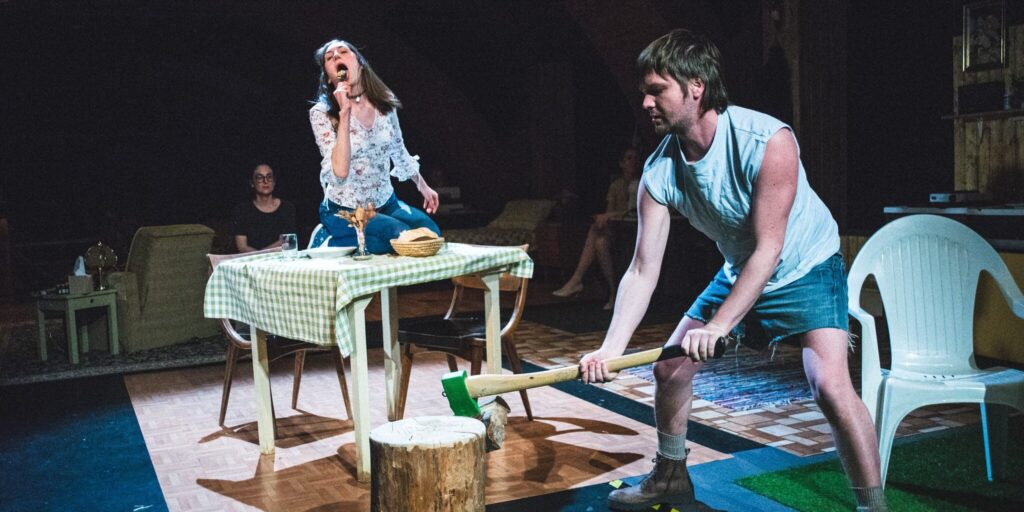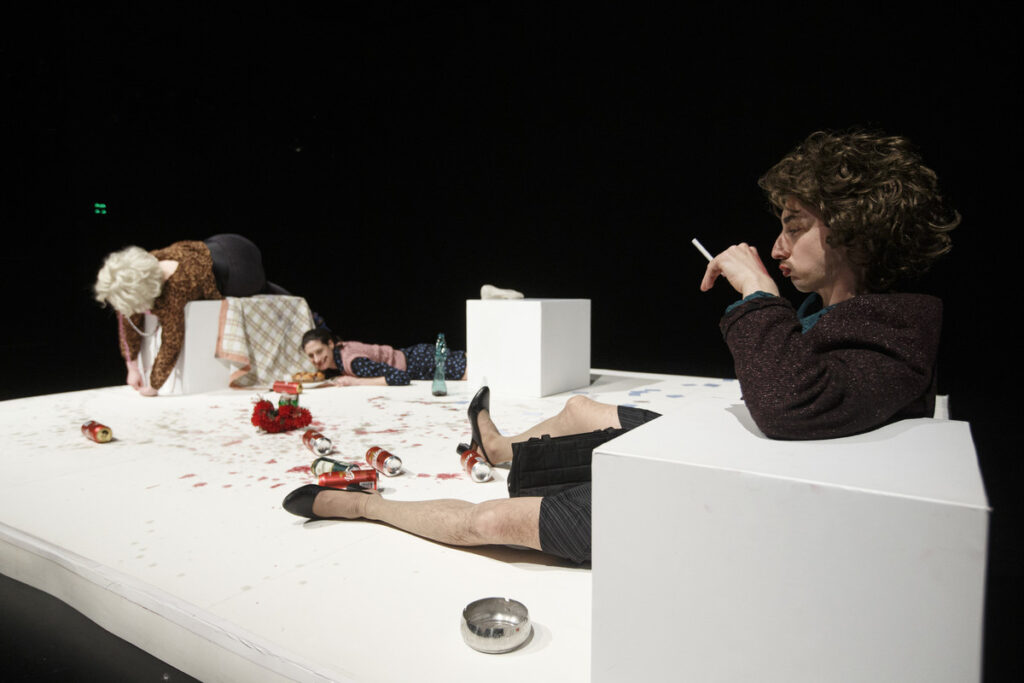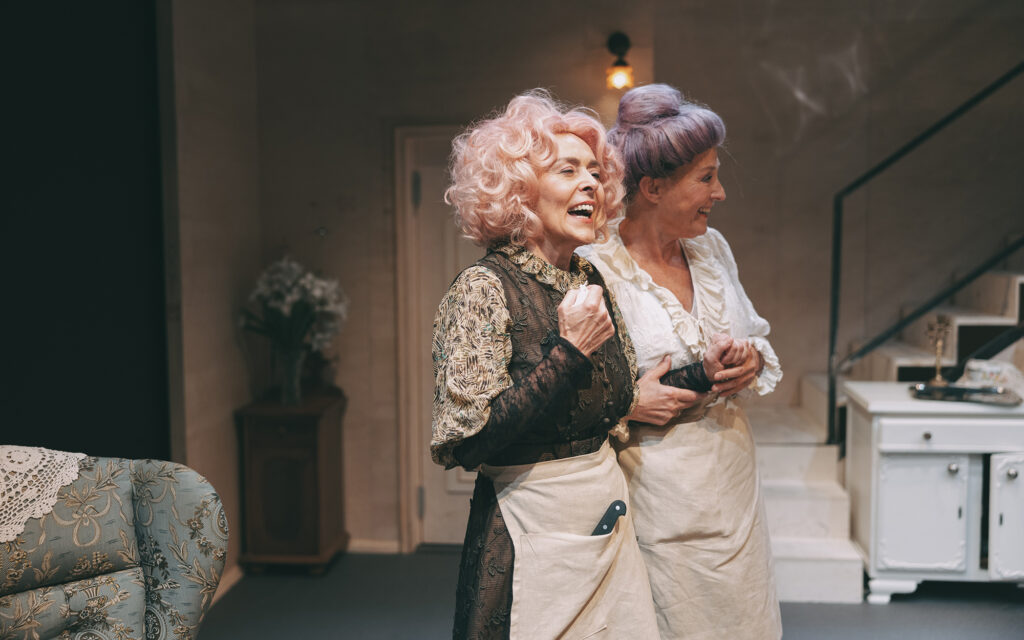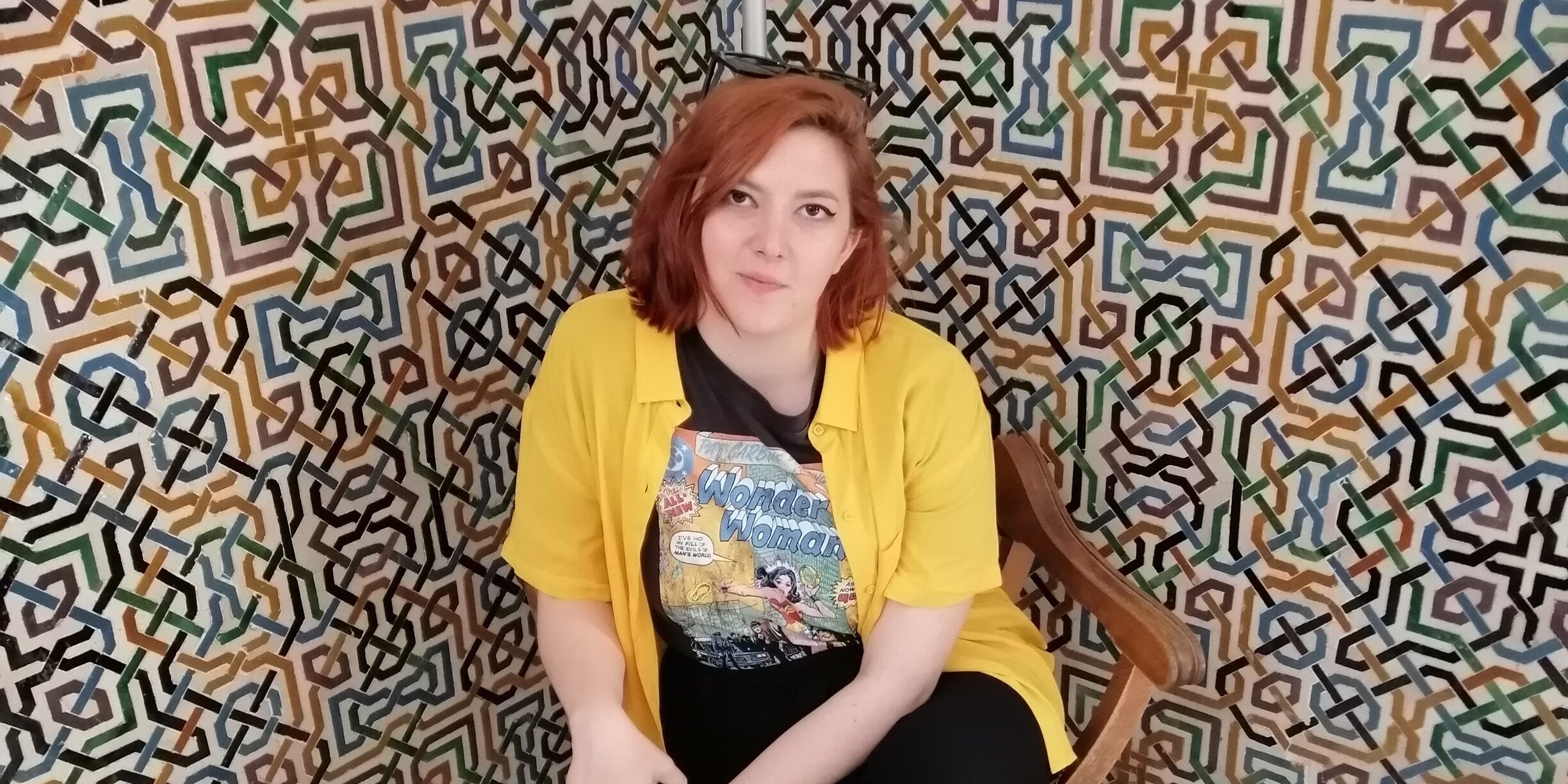Rising star of the Slovenian scene, Nina Ramšak Marković talks to Živa Kadunc about straddling the institutional and independent sectors, her interest in comedy and the changing role of the director.
Since winning the Prešeren Prize for outstanding achievement with her graduation production of The House of Bernarda Alba, Nina Ramšak Marković has made a significant impact on the Slovenian scene, working within institutions as well as in the independent sector, and tackling everything from classic dramas to absurdist comedies.
Živa Kadunc: Am I right in thinking that, since graduating, your work seems to have focused increasingly on contemporary social issues? I’m thinking of The Emigrants, which was staged at SNT Drama Ljubljana, and Women as Lovers, based on the novel by Elfriede Jelinek, which you directed for the Mladinsko Theatre.
Nina Ramšak Marković: I wouldn’t say that those are my only interests, but rather that each performance brings its own context. Looking back at Lovers, for example: I’ve wanted to put this novel on stage for a long time, so it was more of a passion project for me. But I do like the fact that social issues can be addressed in any genre, both through comedy and through more “serious” genres. I wouldn’t say that I have any one clear common denominator, at least at first glance. But if I look at the bigger picture, what interests me on stage is exploring the realities of lower social classes on the fringes of society, the marginalised.
Živa Kadunc: So, you are also interested in comedy, which is still sometimes looked down on as a genre? Women as Lovers, though otherwise fairly tragic, features several comic moments…
Nina Ramšak Marković: Yes, I am a lover of comedy. In my opinion, it’s an overlooked and malnourished genre. I do think that half of Slovene theatre is made up of productions that are meant to make people laugh, so, overall, there are plenty of comedies, but a lot of this space is taken up by more low-brow productions. In terms of more highly-regarded artistic production, there are far fewer comedies. But comedy is actually quite a narrow genre, whereas humorous scenes can actually be placed in any genre. And not just on stage, this is also true on screen. Films dealing with difficult subjects can establish a dimension of humour in certain moments. This is something which I like very much and, if done well, it doesn’t diminish the seriousness of the subject matter, but rather adds a new perspective.

Women as Lovers, Mladinsko Theatre
Živa Kadunc: Can you tell me more about your approach to adapting Women as Lovers for the stage? You and the dramaturg Milan Ramšak Marković seemed to separate the narrative from the dialogue, which was then acted out by the characters. Was your objective to retain the writer’s sharpness of expression, which would otherwise be difficult to convey?
Nina Ramšak Marković: I do find that the language is truly the [strength] of the novel. As I see it, the story isn’t the focal point, it’s not as interesting. It is the narrator of the story who adds the colour and observations, meaning that the world isn’t presented from a neutral perspective. Keeping the language really was the biggest challenge, and in order to make something other than a purely storytelling event, we placed these micro-events, these “acted out” situations – although admittedly dramatically unrich – in between the writer’s words. We wanted to strike a balance between the dramatic momentum and the storytelling, which can bring a lot of colour to otherwise mundane, basic events. Another challenge was that this novel – Jelinek’s debut – has rarely been adapted for the stage.
Živa Kadunc:: In both Lovers and The Emigrants, you have made choices about what to show and what not to show. in Lovers, you show a rape, for example, but not the lifelong trauma that results from it. Similarly, in The Emigrants, the characters don’t experience beatings or police violence.
Nina Ramšak Marković: I try to avoid victimisation, I didn’t want to put my characters in the role of victims. In both productions, we also put thought into the physicality of the actors, of the people themselves, to show physically how they are trapped in their social setting. Migrants, who are undoubtedly victims of the system, also have a human side, a side that is quite ordinary – they are funny, they are well-read, they are intolerant towards each other.
With the other creators [of The Emigrants], we worked very hard to break down the power relationship that is created by the position of victimhood. This position can otherwise create a certain feeling of comfort in the viewer, through agreeing with the issue and feeling sorry for the victim. By experiencing compassion, we might feel as if we can wash our hands of responsibility and participation in the issue, even though we are in a more privileged position.
In any case, much like Jelinek, our aim in Lovers was not to offer an answer that the audience might take as an excuse for the feeling I described; I didn’t even want to take sides, I allowed for a lot of openness about it. Humour gives the characters room to be more than just someone to pity, to not immediately be seen only from a perspective of sympathy. Precisely because you don’t expect humour in the characters’ situation, it’s a great means of overcoming the audience’s experiences and expectations.
Živa Kadunc: You’re also interested in work that class issues, which is something that we often talk about, but usually doesn’t ever go beyond words. Do you think you’ll dedicate more attention to this topic?
Nina Ramšak Marković: I’d like to give the example of Norma Jean Baker of Troy which I directed in the Mini Teater for the 2022/23 season. The play features three women, prostitutes from the very bottom of society, who mainly deal with beauty ideals. The lower we go, the more noticeable societal norms become, the clearer they manifest; the social relations, which are also present in our lives, become more apparent. Because of potential differences this seems like the obvious starting position, but I’m more interested in individual people from these groups. To us, they’re victims, not people, which is a dangerous position to hold. I am interested in exploring this, while also re-examining the [social] position of women, which was also present in Norma Jean Baker of Troy. In a sense, women’s emancipation seems almost dangerous, because while it is given space on the stage, in productions, women somehow still find themselves moulded into typical roles: the victims of sexualisation or the victims of the male gaze, a passive and inferior role. I would like to see women’s emancipation properly explored, not just from the perspective of victimhood, which is sometimes even glorified.
Živa Kadunc: In the last year, I’d say that the role of women is no longer as neglected as it was before [on Slovenian stages]. Perhaps there are still not as many roles for women, but it seems to me that women are fairly strong represented in directing and dramaturgy.
Nina Ramšak Marković: That’s true. The presence of women in highly-regarded productions has increased. However, there might be more women in terms of gender, but there is pressure for those of us who are present to behave in a more stereotypically masculine, authoritative way. The role of director is still perceived in a conservative way. A woman is not necessarily someone to change that, but I find that the position of the director as the alpha and omega is no longer productive or relevant. The principle of traditional work involved knocking actors down, they had to first be torn down completely, they had to suffer, and then, supposedly, they could work well. It can’t all come from a single source of creativity, i.e., the director. The working process is still considered rigid.
Živa Kadunc: Do you find yourself forced into such a position?
Nina Ramšak Marković: I’ve been rather lucky with the casts I’ve worked with, the relationships with other creators were always based on mutual respect. I’ve yet to experience lack of respect. Maybe in that case, I’d advocate for a more authoritative approach. I find it irritating that the actors are regarded as though they were children and that you, as the director, must be there to put your foot down. It’s an outlived principle. Even though one party has more responsibility, in this case the director (at least in institutional settings), there’s no good reason not to foster the notion that we’re here for the common good, that we’re on the same side of the stage. Power relations do show, it’s all quite conservative.

Holy Mothers/Predsednice Photo: Željko Stevanić
Živa Kadunc: Recently, the role of the director in contemporary theatre has been called into question, with horizontal principles of working becoming more common. The roles are transformed, the actors have more power in mutual decision-making. What would a reform of the role of director mean for you?
Nina Ramšak Marković: There is no one answer to that, there cannot be one single principle that would work equally well for the independent scene or any one institution, as each creates – of course – its own working conditions. The matter and context of employment are defined relationships as it is. It would be foolish to pretend that no such relationships exist. On the independent scene, on the other hand, you can choose a team of co-creators who then contribute their original work, making creative role distribution easier. The way our institutions are organised, though, the final decision-making authority still lies with the director.
Changing that would require a long-lasting process and would entail changing everything about production, which is formed by fairly ingrained habits. It is also not always possible for an actor to contribute authorially, of course. Sometimes the actor’s decision to not be included as an author is legitimate, as their aesthetic might not match the director’s. I don’t think it’s fair to demand the actors be included as authors in all projects. I don’t, however, see the future of the director as the artist, who is followed by a long gap, and only then by everyone else. The director cannot represent a wholesome artistic vision.
In the same way that a performance is political as a product, the very same effects of politics can be found in the way creators cooperate and form a community. I don’t support the process itself being messed up, starting unnecessary conflicts for the sake of a product that is, ultimately, supposed to be emancipatory or political for some yet non-existent audience. You impact the world just as much with artistic creation itself as you do with the way you work.
Živa Kadunc: In Women as Lovers, establishing relationships between the cast members must have been especially important given the horrific things they enact towards each other on stage. How did you approach this in terms of safeguarding?
Nina Ramšak Marković: Sexuality and violence on stage are very specific, as they both require the director to make decisions and to take full responsibility. It’s important to create a safe environment, for which there is no one method or recipe. During the creative process, we stressed the question of whether violence for the sake of demonstration is still just a reproduction of violence. Here, in Slovenia, it’s a very open topic. In the West, however, (self)censorship is more common when it comes to showing violence, especially when that violence is aimed at women. The a priori argument is precisely that showing it is also a reproduction of it. Foreign viewers were shocked at the way we depicted violence and how much of it there was in Lovers. However, the danger of censorship, especially in Lovers, is that it is anti-Jelinek, i.e., against the author of the adapted novel. She thought that depicting violence is justified when talking about something painful, something that is happening all around us. We’ve reached a point where censorship is a way to rid yourself of guilt, and I think that’s the lesser of the two options. But I know of cases, where motives of sexuality and violence were abused by directors not for staging purposes, but for some kind of personal aesthetic pleasure. It’s an abuse of power, but here sadly still a grey area. You cannot avoid violence (including sexual violence) when making a stage adaptation of this novel, though.
Živa Kadunc: You work on both the independent sector and in institutional settings. I’d say it’s easier to carry out original projects on the independent scene. Are you more interested in staging productions that adapt existing texts, or are you also interested in purely original theatre?
Nina Ramšak Marković: Definitely. In my mind, I don’t separate staging plays, adaptations, and original pieces. The focus is on how intriguing the theme or text is, or if there’s a particular point of interest that pushes me to find a text to lean on, or adapt, depending on the context of the production process. Anything can be stage production, I could make a silent or dance performance … Young creators get a lot of space within institutions, which quickly requires picking a lane. You’re sorted very quickly and assigned a type, a field. I don’t define myself in terms of genre, theme, or aesthetics, even though there might be some points of contact.

Arsenic and Old Lace, MGL Photo: Peter Giodani
Živa Kadunc: Your next project is Arsenic and Old Lace for MGL...
Nina Ramšak Marković: It’s going to be a dark comedy. It has nothing to do with marginalisation, but deals with evil in the old-fashioned meaning of the word. I’m currently so into this process that’s almost finished and I can hardly talk about it (laughter). It deals with the concept of good taste and the position of comedy itself within bourgeois taste, which also has something to do with the text, Holy Mothers (Predsednice in Slovene, Die Präsidentinnen in the original) by Werner Schwab that I directed last year, and which was at the Maribor Theatre Festival (Borštnikovo srečanje) this summer. Three smart and funny cleaners discussing shit, basically.
Živa Kadunc: Do you attribute your success to the accessibility of your work in terms of content, which you achieve, as you’ve mentioned, through humour?
Nina Ramšak Marković: I support the creation of plays (for example, Lovers) that can be viewed by both an intellectual public and, in terms of theatre, by laypeople. That’s precisely why I don’t want to underestimate the accessibility that humour provides; even if something is intellectual, it doesn’t mean it’s unsuitable for the general public – even if someone doesn’t catch every reference, they can still enjoy the show. I take the target audience and how they might perceive the play into consideration during the creative process. The question of who theatre is created for, is relevant.
Arsenic and Old Lace is at Ljubljana City Theatre (MGL). For tickets and more information, visit: MGL.si
The Emigrants is at SNT Drama Ljubljana. For tickets and more information, visit: Drama.si
Further reading: review of Women as Lovers, directed by Nina Ramšak Marković
Further reading: review of Holy Mothers, directed by Nina Ramšak Marković
Živa Kadunc is a critic of contemporary performance art and a speaker on Radio Študent (Slovenia). She loves her plants.








